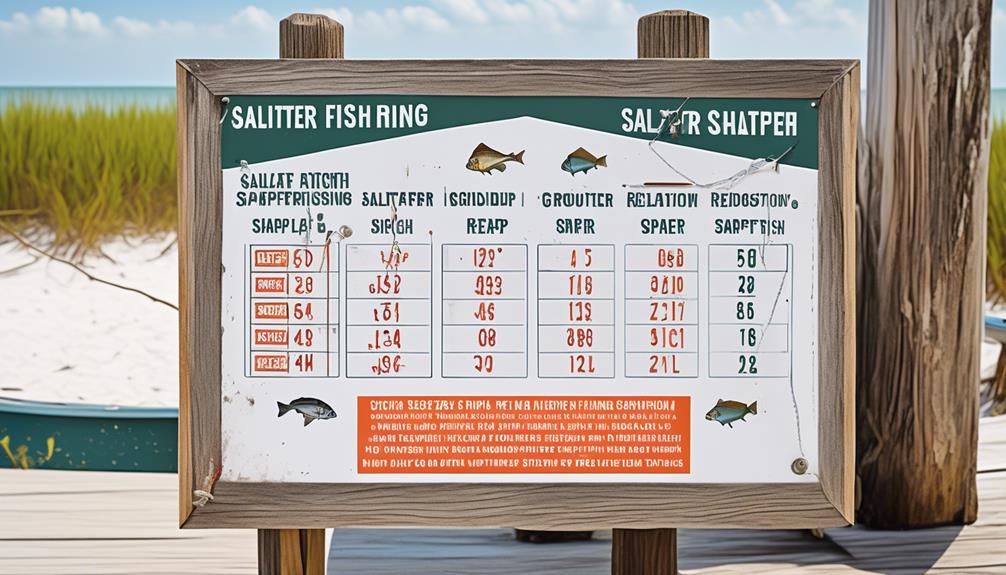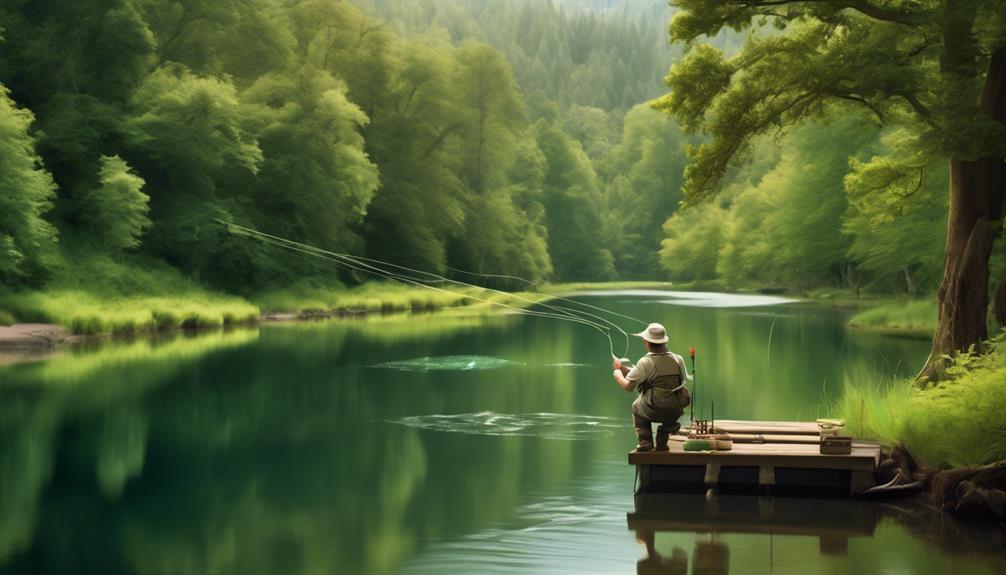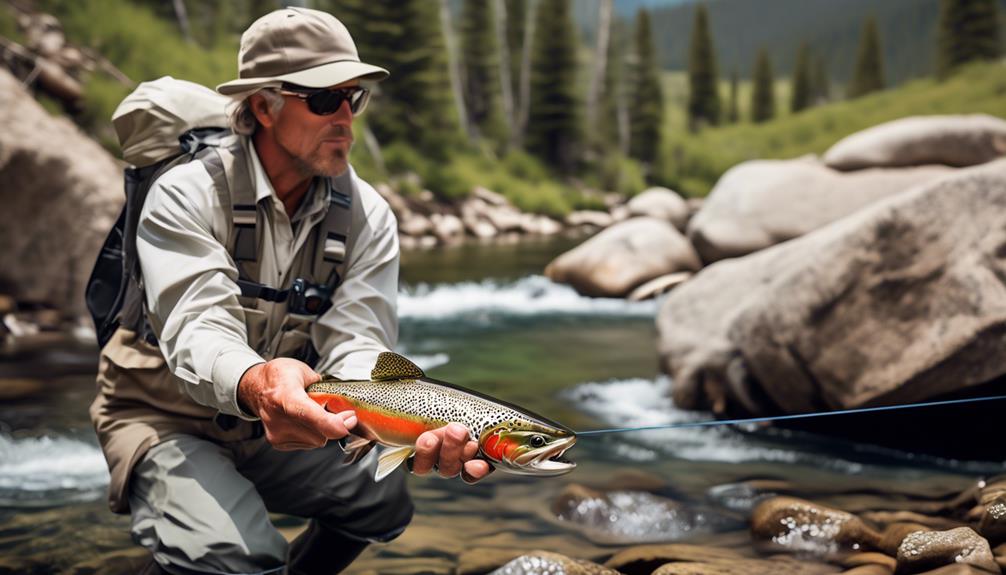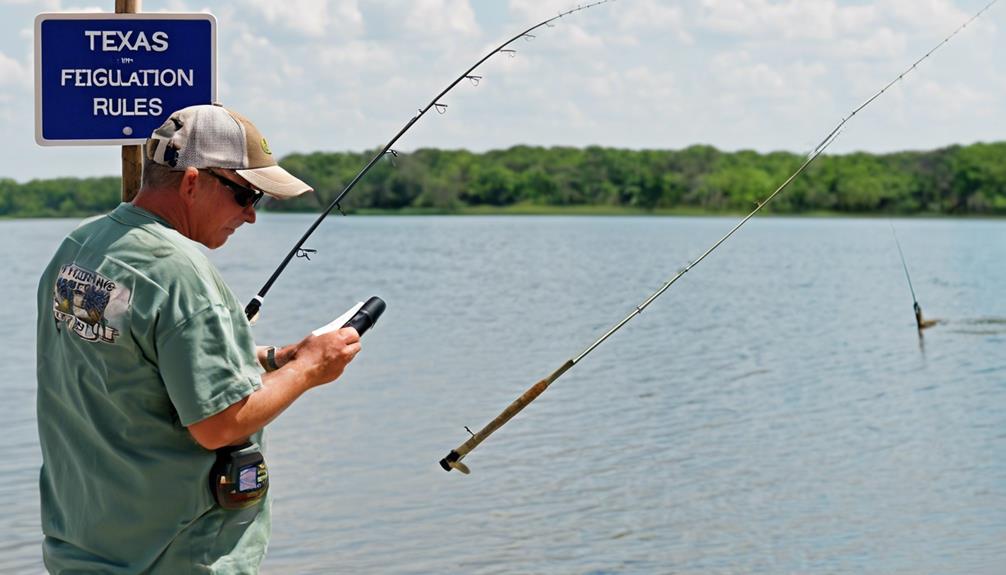Do you know if the saltwater fishing regulations in Florida have recently changed?
With the diverse range of marine species and ecosystems in the state, staying up to date with the current regulations is crucial for any angler.
Whether you're a seasoned fisherman or a beginner looking to cast your line in Florida's waters, understanding the rules and guidelines is essential to ensure the sustainability of the marine environment and the enjoyment of the fishing experience.
So, let's explore the current saltwater fishing regulations in Florida and how they may impact your next angling adventure.
Types of Saltwater Fishing Licenses
To fish in Florida's saltwater, you must obtain the appropriate type of saltwater fishing license. The license requirements vary depending on factors such as residency status, age, and duration of the fishing trip. For residents, there are annual, five-year, and lifetime fishing license options available. Non-residents can choose from three-day, seven-day, or annual fishing permits. Additionally, there are special discounted fishing permits for seniors, military personnel, and disabled individuals. It's important to carefully consider the different fishing permit options to ensure you have the right one for your needs.
For those who only plan to fish occasionally, the short-term permits may be the best option. The three-day and seven-day permits are popular choices for tourists and visitors. They provide flexibility for individuals who want to try saltwater fishing without committing to a longer-term license. On the other hand, regular anglers may find the annual or multi-year licenses more cost-effective in the long run. These licenses offer the convenience of not having to renew frequently and are ideal for those who fish frequently throughout the year.
Before purchasing a saltwater fishing license, it's crucial to review the specific rules and regulations associated with each type of permit. By understanding the license requirements and fishing permit options, you can ensure that you're compliant with Florida's saltwater fishing regulations while enjoying your fishing experience.
Size and Bag Limits for Popular Species
When fishing for popular species in Florida's saltwater, be mindful of the specific size and bag limits set by regulations to ensure compliance and preservation of marine resources.
Understanding the catch measurement and bag restrictions for popular species is crucial to promote sustainable fishing practices. Here are some important guidelines to keep in mind:
- Catch Measurement:
- It's important to measure the length of the fish from the tip of the snout to the tip of the tail to ensure it meets the minimum size requirement.
- Always carry a measuring device to accurately determine whether a catch is within the legal size limit.
- If a fish is undersized, carefully release it back into the water to support conservation efforts.
- Bag Restrictions:
- Familiarize yourself with the specific bag limits for each species, as they vary widely.
- Bag limits may include restrictions on the number of fish you can keep per person per day.
- It's essential to adhere to these restrictions to prevent overfishing and help maintain healthy fish populations.
Restricted and Prohibited Species
Before heading out for saltwater fishing in Florida, ensure you're familiar with the list of restricted and prohibited species to avoid inadvertently catching or possessing them. The state of Florida has strict regulations in place to protect endangered species and support conservation efforts. It's crucial for all anglers to understand the impact of overfishing and the importance of sustainable practices in maintaining healthy fish populations.
Florida's restricted and prohibited species list includes various marine animals such as sawfish, Nassau grouper, goliath grouper, and several species of sharks and rays. These species are protected under state and federal laws due to their vulnerable status. Engaging in the accidental capture or possession of these species can result in severe penalties, including fines and legal consequences. It's vital for anglers to stay informed about the current list of restricted and prohibited species to avoid any unintentional violations.
Conservation efforts play a significant role in ensuring the longevity of these species and their habitats. Overfishing has led to population declines, disrupting the balance of marine ecosystems. By adhering to regulations and practicing sustainable fishing methods, anglers can contribute to the conservation of these species. It's essential to release any restricted or prohibited species with care to minimize harm and support their recovery.
Special Fishing Zones and Marine Protected Areas
Explore Florida's special fishing zones and marine protected areas to discover designated areas that offer unique opportunities for anglers. These areas are crucial for marine sanctuaries and conservation efforts, ensuring the protection and preservation of the diverse marine ecosystems. As an angler, understanding the ecological impact and the significance of sustainable fishing practices in these areas is essential.
Here's what you need to know:
- Marine Sanctuaries: Florida boasts several marine sanctuaries, such as the Florida Keys National Marine Sanctuary and the Biscayne Bay Aquatic Preserves, providing a haven for diverse marine life and habitats. These sanctuaries are vital for protecting endangered species and preserving the delicate balance of the underwater environment.
- Conservation Efforts: The state has implemented various conservation initiatives to safeguard marine life and habitats. These efforts aim to maintain the ecological balance and ensure the sustainability of fish populations for future generations.
- Ecological Impact and Sustainable Fishing Practices: When fishing in these special zones, it's crucial to understand the ecological impact of your actions. Adhering to sustainable fishing practices, such as catch-and-release methods and respecting size and bag limits, is paramount for maintaining the health of the marine environment.
Seasonal Closures and Open Seasons
As you navigate Florida's special fishing zones and marine protected areas, it's important to be aware of the seasonal closures and open seasons that directly impact your angling experience. Fishing conservation is a top priority in Florida, and seasonal closures play a crucial role in protecting vulnerable fish species during their spawning seasons. These closures are designed to minimize the environmental impact of fishing activities, allowing fish populations to replenish and ensuring sustainable angling opportunities for future generations.
Understanding the open seasons for different fish species is essential for planning successful fishing trips. Florida's Fish and Wildlife Conservation Commission regularly updates and publishes information regarding open seasons for various fish species, taking into account factors such as population health and migration patterns. By adhering to these open season regulations, anglers can contribute to fishing conservation efforts and help maintain the ecological balance of Florida's marine ecosystems.
It's worth noting that seasonal closures and open seasons may vary by region and can change from year to year, so staying informed about the latest updates is crucial. Additionally, some areas may have specific regulations or exemptions, so it's important to familiarize yourself with the rules that apply to the particular fishing location you plan to visit.
Gear and Equipment Regulations
Are you aware of the gear and equipment regulations that apply to saltwater fishing in Florida? It's crucial to understand the rules to ensure compliance and contribute to the conservation of marine resources. Here are some key points to keep in mind:
- Recreational Fishing: For recreational anglers, there are specific gear and equipment regulations to follow. This includes guidelines on the types of hooks, lines, and nets that can be used. It's important to stay informed about any size or quantity limits for certain species, as well as the use of traps and devices.
- Commercial Fishing: If you're involved in commercial fishing activities, there are stringent regulations governing the gear and equipment that can be utilized. This encompasses restrictions on the types of fishing gear, such as trawls, dredges, and longlines. Additionally, there are regulations related to the use of turtle excluder devices and other measures aimed at minimizing bycatch and protecting endangered species.
- Enforcement and Penalties: Florida has enforcement mechanisms in place to uphold gear and equipment regulations. Violating these rules can result in fines, confiscation of gear, and potential legal consequences. It's essential to stay informed about the latest regulations and ensure full compliance to avoid penalties.
Understanding the gear and equipment regulations for both recreational and commercial fishing is essential for all anglers and fishermen operating in Florida's saltwater areas. By adhering to these regulations, you can contribute to sustainable fishing practices and the preservation of marine ecosystems.
Catch Reporting and Data Collection Requirements
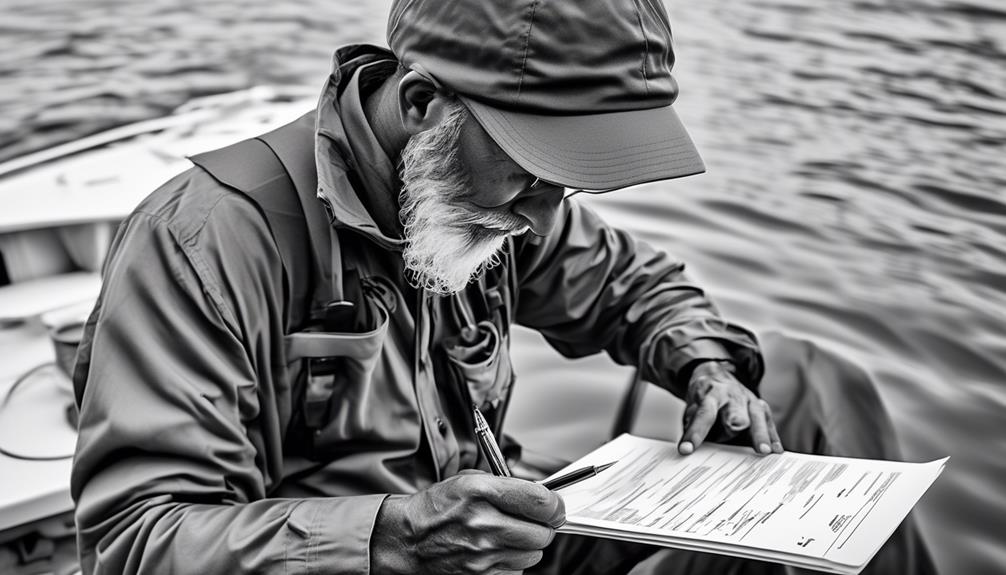
Understanding the catch reporting and data collection requirements is essential for maintaining accurate records of your fishing activities in Florida's saltwater areas. Florida requires recreational saltwater anglers to report their catches through the state's online or phone-based reporting systems. These reporting methods help fisheries managers collect crucial data on catch numbers, species, and fishing effort, which in turn aids in sustainable fisheries management.
Compliance enforcement is taken seriously in Florida, and failure to adhere to catch reporting requirements can result in penalties. To ensure that anglers comply with reporting regulations, the Florida Fish and Wildlife Conservation Commission (FWC) conducts regular checks and inspections. It's important to stay informed about the reporting deadlines and to accurately report your catches to avoid potential penalties.
In addition to contributing to data accuracy, adhering to reporting requirements also provides valuable information for stock assessments, habitat protection, and fishing regulations. By following the reporting guidelines, you actively participate in the conservation and sustainable management of Florida's saltwater fish stocks.
When out on the water, remember to keep detailed records of your catches and promptly report them through the designated methods. This not only helps in maintaining the health of Florida's marine ecosystems but also ensures that you remain in compliance with the state's saltwater fishing regulations.
Additional Resources for Anglers
Maximize your fishing experience in Florida's saltwater areas by taking advantage of the additional resources available for anglers. Here are some key resources to enhance your angling endeavors:
- Fishing Tournaments: Participating in fishing tournaments not only adds a competitive edge to your fishing experience but also contributes to conservation efforts. Many tournaments promote sustainable practices and support conservation initiatives, making them a valuable platform for anglers to engage in responsible fishing practices while enjoying the thrill of competition.
- Look for tournaments that prioritize catch and release practices, as they play a vital role in preserving fish populations and ensuring the sustainability of Florida's saltwater ecosystems.
- Engage in tournaments that prioritize conservation efforts, such as those that support marine habitat restoration projects or promote responsible fishing practices through educational initiatives.
- Catch and Release: Embracing catch and release practices is crucial for maintaining healthy fish populations. Utilize resources that provide guidelines for proper catch and release techniques, ensuring that the fish you release have the best chance of survival.
- Sustainable Practices: Stay informed about sustainable fishing practices through resources that offer insights into eco-friendly angling methods, gear choices, and habitat conservation. By adopting sustainable practices, you can contribute to the long-term health of Florida's saltwater fishery resources while enjoying a fulfilling angling experience.
Frequently Asked Questions
Can I Fish for Sharks From the Shore in Florida?
You can fish for sharks from the shore in Florida, but be aware of beach regulations and shark conservation. Practice catch and release and follow sustainable fishing practices to help preserve the shark population.
Are There Any Specific Regulations for Catching and Releasing Fish in Florida?
When catching and releasing fish in Florida, follow catch and release guidelines to support conservation efforts. It's essential for sustainability and ethical fishing practices. By doing so, you contribute to the preservation of marine ecosystems.
Can I Use a Cast Net to Catch Bait Fish in Florida Waters?
Sure, you can use a cast net to catch bait fish in Florida waters, but there are regulations to follow. Make sure to check for any specific restrictions on cast net usage and bait fish catch limits.
Are There Any Restrictions on Using Chum to Attract Fish While Saltwater Fishing in Florida?
When saltwater fishing in Florida, using chum is regulated. It is legal to use chum to attract fish, but there are restrictions on using chum to attract sharks, especially near certain coastal areas.
Are There Any Specific Regulations for Spearfishing in Florida?
When spearfishing in Florida, you must follow specific regulations. Equipment requirements and spearfishing locations are important to consider. Make sure to check the current rules and regulations to ensure compliance while enjoying this activity.
Conclusion
So, make sure you have the right license, know the size and bag limits, and follow all the regulations when you go saltwater fishing in Florida.
It's important to protect the marine environment and ensure sustainable fishing for future generations.
Happy fishing!
